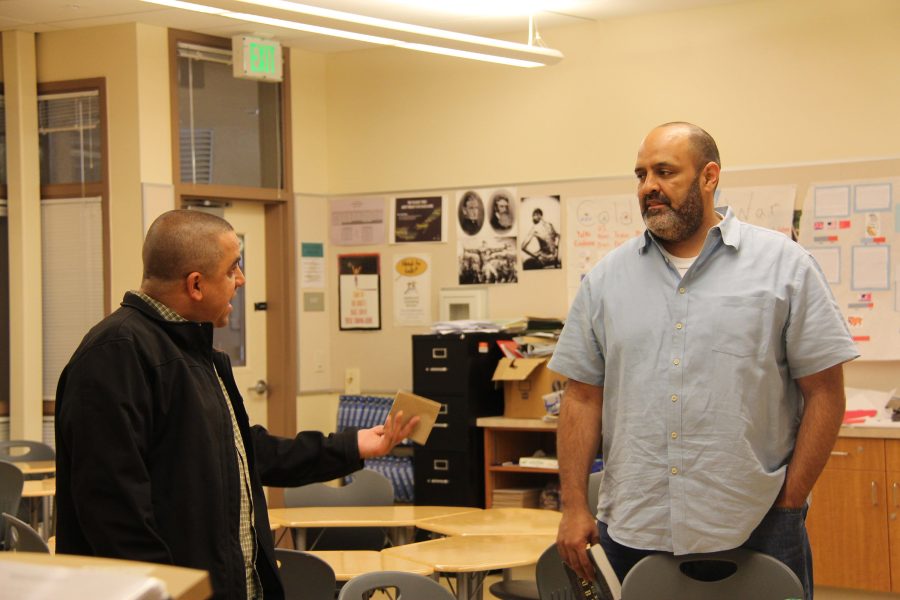Interdepartmental coordination would ease student stress
Teachers should implement communication between departments to prevent multiple tests in a short period
Ella Mernyk/The Campanile
Though some teachers discuss with each other regularly, this intercommunication should be a protocol between all departments.
As high school students, we occasionally face a convergence of exams from many classes over the period of one week. No, not just finals. These weeks can be any time between August and June and occur when all the tests from various classes come fatefully crashing down on us, a phenomenon I would like to call “Hell Week.” Yes, “Hell Weeks” are painful and difficult. But there is a way for teachers to stop them.
My solution to eliminating “Hell Weeks” and thus reducing stress is to establish a protocol where teachers coordinate between departments. If teachers had meetings to plan out testing schedules, students would not have to worry about studying for multiple tests on the same day or projects and presentations coinciding.
Ideally, teachers from different subjects would take time to organize a year-long comprehensive test schedule, which would be revised as the year progresses. If not, a certain amount of time should be allocated during staff meetings for departments to converse with one another in order to prevent tests from coinciding.
There are no current standards which require interdepartmental coordination, so teachers are not obliged to schedule their tests on separate days. While some teachers from different departments do coordinate, the extent to which they do so is insufficient. I admit that the level of communication I am suggesting would create extra work for teachers; but it is important to keep in mind the needs of students, especially considering recent predicaments surrounding mental health in Palo Unified School District high schools.
I have had my fair share of “Hell Weeks” and always find them frustrating as well as difficult. In such a high stress community, I believe that our teachers, who work hard to give meaningful lessons, should divert more attention to ensuring that students are not too mentally taxed when being tested.
Currently, Paly teachers are willing to reschedule tests in individual cases, but not to do so for a whole class of students.
“The focus is on student-teacher communication rather than interdepartmental communication,” math teacher Cynthia Chen said. “When a student speaks with me about their concerns about having multiple tests on the same day, then I work with the student to move the math test to a mutually agreed upon time and date; this is true for many other teachers in the math department.”
History teacher Adam Yonkers feels that individual meetings, though helpful, are insufficient.
“In a school the size of Paly, there are a lot of logistical issues, but at the very least for students’ workloads, [more interdepartmental communication] would be a very good thing to do,” Yonkers said.
Implementing further interdepartmental coordination is a better alternative to individual meetings, as it applies to all students rather than just a few. Some students may not feel comfortable approaching their teachers or have other reasons for not asking for a test to be rescheduled.
It is true that I am writing from my own personal experiences, but other students have encountered similar difficulties in regards to having multiple proximate tests.
Sophomore Chinmay Tyagi also has a knowledge and vehement dislike of “Hell Weeks.”
Tyagi expressed concerns about having multiple tests coincide and its effect on his stress levels.
“I propose a mandatory weekly meeting between departments, where they have to make sure students are not overburdened with tests in any given week,” Tyagi said.
There are two other factors to take into account when considering increasing communication between teachers and thereby lessening student stress: student appreciation of subject material and teacher appreciation of subject material. If a student has to focus on three additional subjects while trying to learn new material and study for a test, the stress caused by his or her need to prepare for other classes will reduce their enjoyment for learning. Consequently, teachers who need to instruct or prepare students during a “Hell Week” will have a more difficult time conveying information to a class full of stressed and unfocused pupils.
Additionally, studies conducted at the University of Maastricht in Holland and the University of Uyo in Nigeria show a positive correlation between time spent studying and test achievement, meaning students who can spend sufficient amount of time studying for one test outperform students who have to split their time studying for multiple tests.
At the end of the day, it is up to Paly teachers and administrators whether or not they wish to coordinate more. I urge them to consider increasing communication for everyone’s sake at all levels of the school system. When students are faced with several tests over the course of one or two days, their stress levels increase to unhealthy extremities. Interdepartmental coordination would entail huge benefits and make Paly a happier and healthier place to be.
Your donation will support the student journalists of Palo Alto High School's newspaper

